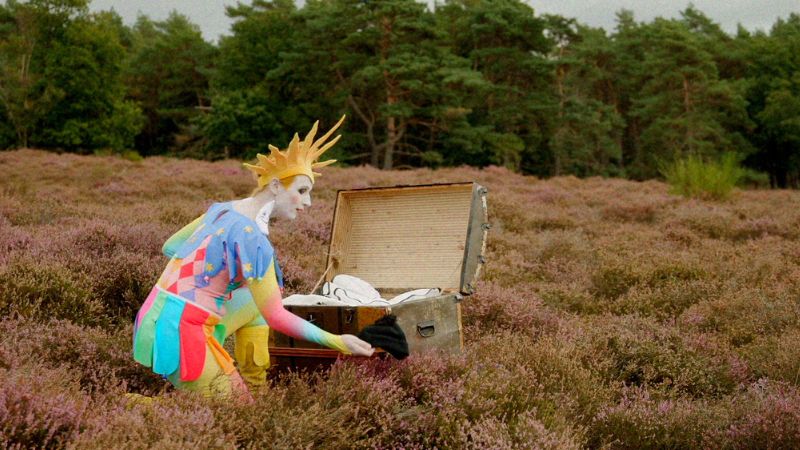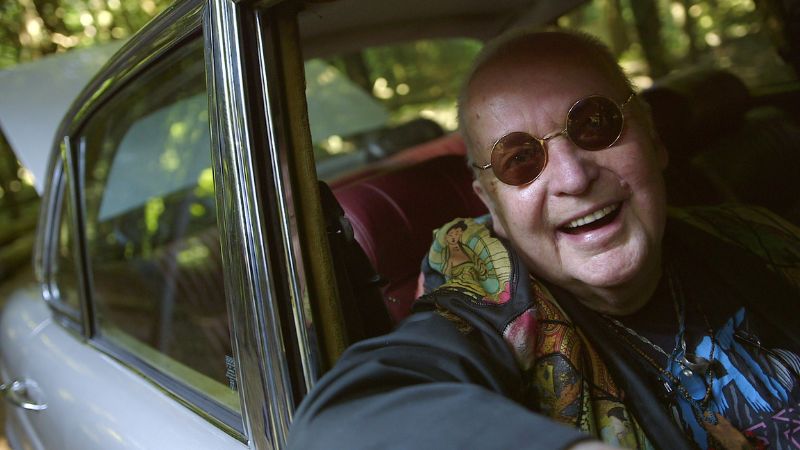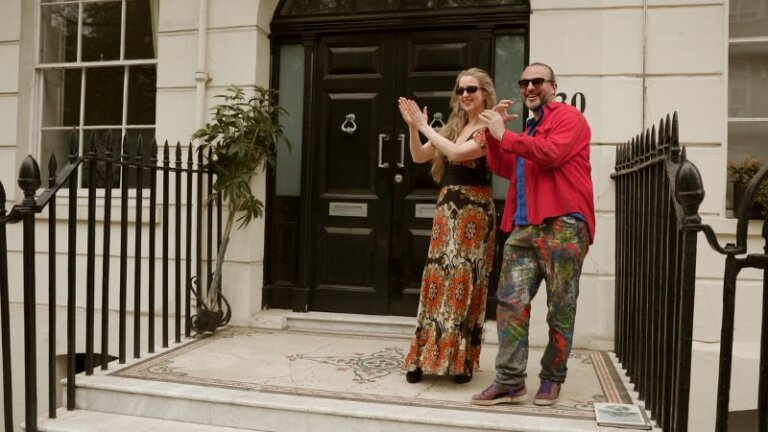In the 1960s, The Fool, a vibrant artist collective featuring avant-garde artists Barry Finch and Josje Leeger, played a pivotal role in shaping the visual landscape of the era, collaborating closely with icons like The Beatles, Jimi Hendrix, and Eric Clapton. Following their parents’ deaths, Jade and Scarlet Finch embark on a journey to unearth the significance of their legacy, traversing from London to Los Angeles and Ibiza to Amsterdam. They retrace their steps to legendary locales and reconnect with old family friends such as Graham Nash, Donovan, and Bruce Dickinson of Iron Maiden. Their exploration is interlaced with scenes from Fools Paradise, a musical penned by Barry and Josje in the 70s, intended as a sequel to the groundbreaking Hair, focusing on the quest for identity. Through their adventures, Jade and Scarlet revisit their rock-and-roll heritage, realizing that embodying “the Fool” is a tribute to pursuing one’s dreams, underpinning the essence of life’s meaning.
As the opening film of the 2024 IN-EDIT NL Music Documentary Film Festival, Director Joris Postema documents Jade and Scarlet’s journey in Be The Fool. With its sold out opening night screening on April 11th, we spoke with both Joris Postema and Jade Finch extensively.

Joris, let’s start with you. I was familiar with some of your work before, including your film Stop Filming Us. The subject matter of Stop Filming Us is quite different from this new film’s. Could you talk about the original inspiration for Be The Fool? How long have you been developing it, and could you discuss the evolution from Stop Filming Us to Be The Fool?
Joris Postema: It’s quite funny because Be The Fool actually started way before Stop Filming Us. The inception of Be The Fool began with my acquaintance, Daniel, whose children were classmates with my son. About eight or nine years ago, Daniel shared the story of the Fool and their parents with me and suggested I contact his brother, Jade, for more details. Developing Be The Fool was challenging initially. Finding a broadcaster willing to support a film that intertwined cultural topics with family dynamics was difficult. Then, the onset of the COVID-19 pandemic further complicated matters, as travel was essential for the film’s production. Consequently, Stop Filming Us was made somewhat in the midst of developing Be The Fool.
Could you expand on what initially drew you to this story and how the production and narrative presentation evolved from the early stages to the final film?
JP: My interest was sparked by several factors. Firstly, my affection for the Beatles led me to the story of the Fool. Upon meeting the child of one of the Fool members, I was immediately intrigued.
Additionally, my previous work on a film about a friend’s complex relationship with his father contrasted with the narrative surrounding The Fool, where the family members viewed their parents’ legacy as something special and worth sharing. This contrast, coupled with my love for the Beatles and the unique story of the Fool, blended into the creation of this film.
In terms of narrative evolution, the process involved extensive discussions and research to piece together the entire story. Integrating The Fool’s Paradise into the film was particularly important through its thematic significance and creative reenactments. This musical aspect, intended as a successor to Hair, showcased the identity search that resonates universally.
Jade, I have consistently been intrigued by the 1960s and the hippie era, including the fool concept. The film explains the traditional role of the fool in the king’s court, but I see it as part of a broader iconography tied to ancient concepts, like oracles and jesters. From your experience, what sparked that generation’s interest in such figures from antiquity?
Jade Finch: The inspiration spans the spectrum of all cultures, esoterics, and history. The fool character, especially through Tarot, offered a rich layer of understanding and inspiration that became a driving force for us. It encouraged being gracious dreamers—believing in and pursuing dreams. This documentary partially reflects my journey of discovering how my generation drew inspiration from these ancient figures. It wasn’t necessarily part of my upbringing, but the significance became clearer as I grew older and delved deeper. My commitment to completing my father’s music, particularly Fool’s Paradise, was a personal journey to close the circle of their life’s work. This exploration into the fool, both historically and esoterically, has fascinating parallels with our story.

From what you know or have experienced, was Dutch society broadly liberal and open-minded in the 60s? How did your parents fit within the broader context of the country’s society then?
JF: My parents had a unique position. My father was English, so he wasn’t deeply integrated into Dutch society in the 60s, unlike my mother. Amsterdam was essentially the epicenter of progressive thought at that time. The Netherlands, in general, was ahead of its time during the mid-60s. Amsterdam was considered the magical center of the world, with movements like Provos challenging societal norms and pushing for change. This period was marked by a confluence of substances, music, and creativity, fostering a significant cultural movement. My parents were in the heart of it, happy to contribute to the fashion and creative expressions of the time. They were part of making bold statements and creating ‘happenings’ that left a substantial impact on that generation.
The country eventually felt too small for the ambitions of the fool’s members, who were known for their talent and creativity, dressing everyone in vibrant colors and making use of whatever materials they could find.
Did they experience any social pushback from other societal factions? For example, the counterculture movement faced both support and opposition in America, a dynamic perfectly encapsulated by films like Easy Rider. Even if the country leaned more liberal and open-minded, was there any encounter with antagonism towards it that you’re aware of?
JF: Of course, I wasn’t there personally, but from what I understand, there were certainly demonstrations against the establishment, including the royal family. The Netherlands was quite socialistic then, making it a somewhat conducive environment for expressing oneself liberally. However, there were indeed demonstrations, and naturally, there were crackdowns. Comparing it to the US, with its segregation and more authoritarian society, is challenging. Here, the emphasis was on advocating for change, new ideas, and scrutinizing longstanding societal structures. So yes, there was resistance, but the liberal nature of Dutch society, especially in recent decades, provided a space for these new ideas to evolve.
JP: Indeed, they faced backlash as foreigners pioneering in new territories. This was evident when they painted the woods, a unique but not widely accepted move, leading to it being cleaned off shortly after. Being first with something often attracts opposition. This was similar to the case of the Apple boutique, which also faced quick backlash.
There’s a moment in the film where you, as the director, are heard off-camera discussing the importance of delving into specific details with Scarlet who hesitates to do so. This scene distinctively places you within the narrative. Can you explain the significance of including this moment and how it contributes to the broader narrative?
JP: That scene is pivotal for several reasons. First, it showcases Scarlet’s character, mainly her frustration with me, which I find cinematically valuable. It highlights the complexity of storytelling—balancing between the rich, colorful, and sometimes difficult aspects of their upbringing. This moment illustrates that not everything is perfect, emphasizing the importance of telling their story, including the challenges they faced, like having to leave the United States. Although Scarlet was hesitant to discuss these specifics, her brief engagement was sufficient to convey the message that their life, though vibrant and filled with rock and roll, also had its hardships. This dynamic is crucial for understanding the full scope of their story.
JF: We can laugh about it now. Yes, there were differences in how we wanted to tell the story, but ultimately, Joris and I always managed to put our heads together and lay all the cards on the table. There were ups and downs, of course. As a director, he had to address topics he found important for the story, including creating a family portrait. Understanding the decisions that led us to move across the world was crucial. The reason we left the States, for instance, involves various narratives. My perspective, perhaps deeper than my siblings’, comes from working closely with my dad. I delved into the intricacies of our history, questioning why we had to leave the States. My dad faced legal issues, not because he was guilty, but because fighting the accusations would have been too burdensome. Another opportunity presented itself in Europe, making our decision to move straightforward. Our family faced numerous challenges, and we did encounter disagreements on how to present these stories. I believe it’s important to share these aspects, demonstrating our resilience as a family and the difficult decisions we faced. Scarlet wasn’t expecting to discuss certain topics during the shoot, which explains her reaction. As I see it, the truth encompasses much more than what was shown in the film, highlighting our journey as a revolutionary family of rainbow warriors facing cultural and legal challenges.

Your description of a revolutionary family of rainbow warriors is compelling. Reflecting on your childhood and siblings, can you recall a specific moment or event when you became aware of living a counterculture lifestyle?
JF: Yes, you begin to notice when you visit friends’ homes and see how different their lives are from yours. Unlike their homes, friends never wanted to leave our house because it was so full of life, creativity, and color. Our household was strict, contrary to what some might assume, but it was also loving and vibrant. This diversity in upbringing provided a stark contrast and served as a reality check for me at a young age when I realized just how unique our family was.
As a child, did you embrace this unique upbringing, or was it something you found challenging?
JF: Everyone in the family reacted differently, but personally, I embraced it. Even as a young child, I was fond of the counterculture lifestyle, wearing clothes my mother made and living according to our family’s unconventional norms. My siblings and I each had our own journeys in relation to our upbringing, with varying degrees of acceptance and struggle.
I’m the younger one, but my eldest sister always got dragged along wherever we went. She was always making new friends and starting new schools. Then we moved to England, then to Ibiza. It always felt like we were moving again just as you were settling in. But for me, being a bit younger and settling down in Amsterdam, this became my home base. We stayed here. But for my siblings, particularly the older ones, it felt more like constantly being on the move, which I believe was a bit harder for them.
I’ll return to discussing Ibiza shortly. Before that, Joris, could you share the most challenging aspect of making this film? With elements like animation, archives, traveling, and negotiations with funders or distributors, what, from a director’s perspective—even if it seems dry or practical—was the most challenging part of completing this film?
JP: Financial aspects of filmmaking are indeed complex, but thankfully, I have a producer who significantly aids with that, or perhaps it’s more accurate to say I assist them. However, the most challenging part was balancing the depiction of the Fool’s vibrant life story and their significant impact on the narrative of family struggles. There were difficult times; they had to leave the States and Ibiza. Not to mention the tragic losses within the family. Balancing these narratives was difficult because I wanted to do justice to the larger story but also needed to highlight these personal struggles to give the larger story its due resonance. This balance was particularly tough, and Jade and I did not always see eye to eye on this. In the end, though, I believe we struck the right balance, although Jade might have a different view on this.
JF: Achieving the right balance was tricky. Joris has his vision as a director, aiming to tell a story that aligns with public interest and understanding. It’s a fine line to walk. I’ve always pushed for a narrative that inspires, drawing heavily from my parents’ inspiring stories. Life is full of ups and downs, and presenting these complexities in a documentary format is challenging. My life experiences contributed to the film’s depth; at times, what was significant to me differed from Joris’s view. Balancing these aspects and deciding what to include was a collaborative process, though not without its difficulties. We had to make tough choices about what elements made it into the final cut, acknowledging that a documentary can’t cover everything. In the end, the film turned out beautifully, although part of me wishes for a second version to tell even more of the story.
Considering the vast amount of anecdotes and stories fit for inclusion, was there a point where you both had to decide against including something you personally found important?
JP: Yes, there were several moments like that. I would have loved to delve deeper into the creation of Fool’s Paradise. It’s a fascinating story involving two couples, intense collaboration, and, ultimately, unresolvable differences that halted the project. This storyline would have added significant value to the film, but it was left out due to pacing and narrative flow. The editing process required tough decisions, sacrificing some stories to maintain the overall rhythm of the film.
JF: Adding more to that, we captured some compelling content. To clarify a point from Joris, Fool’s Paradise actually originated from the collective’s earlier collaboration, commissioned by Michael Butler of Hair. Unfortunately, they couldn’t complete it as planned due to clashing egos. They attempted a reunion to finish the script, which my parents eventually did in their own version. This script, which I’ve known since childhood, looked like a comic to me back then but represents much more, embodying their belief in self-discovery and identity. It’s a great metaphor and an essential part of our story I hoped to bring to life through the film. There’s much more to tell, but we’ve included as much as possible in the movie, along with other significant aspects.
Was there a specific location or person you wished to feature in the film but couldn’t?
JF: Indeed, featuring one of The Beatles would have been phenomenal. We managed to include Donovan, who embodies the mythological rock star ethos perfectly. It would have been interesting to hear from Ringo Starr, Mick Jagger, or any of The Rolling Stones, given their close ties to the creative epicenter in London at that time. I hoped for a broader recognition of The Fool’s influence beyond just rock and roll music, acknowledging their impact on style, fashion, and aesthetics.
JP: Personally, I would have loved to include John Lennon or Joni Mitchell, who was nearly involved but was too fragile at the time. Eric Clapton was another wishful inclusion. Their stories, along with those of other icons, enrich the narrative with diverse perspectives on that era.
JF: Handing over my family’s archives to Joris was a leap of faith. These included everything from personal celebrations to intimate family moments. The rest of the footage came from various media archives, which were not easy to procure. There’s likely more out there, capturing those transformative years.
So Jade, reflecting on your childhood and the travels with your family, do you have a favorite place or memory from those times? A country or city that left a positive impact on you?
JF: That’s probably a question better suited for my older siblings. But I know I’m a nature boy at heart. Cities have their charm, but I need breaks to reconnect with nature, often retreating to Indonesia to recharge. The places we’ve lived, from the States to Ibiza and the Dutch countryside, instilled in me a profound connection with nature. While cities offer growth as an international citizen, I sometimes miss the open spaces of the countryside, balancing the best of both worlds.
I’m curious about your early memories of Ibiza before the Acid House era. Can you share what it was like?
JF: It was very family-oriented. My mother shifted from fashion design to art, embracing beach life. My father, the revolutionary, connected the dots, bringing rock and roll to Spain post-Franco. Ibiza’s liberal atmosphere made it a hub for music, transitioning from a hippie to a musical island. My father played a pivotal role in bringing major artists to Ibiza, which wasn’t easy given the cultural and legal challenges at the time.
What about the Bob Marley show? Any interesting anecdotes from his first Spanish performance?
JF: Bob Marley’s performance wasn’t his only in Spain but his first, marking a significant moment. After successfully bringing Eric Clapton to Ibiza, my father was tasked with bringing Marley to the island. Negotiating amidst Marley’s concerns about political implications, my father focused on the music, securing Marley’s participation. The concert’s preparation involved unique requests aligning with Rastafarian beliefs and faced logistical challenges. Yet, it remains a legendary event in Ibiza, celebrated for its communal and vibrant atmosphere.
I have one final question for both of you, aiming to understand your different perspectives on the same matter. Let’s start with you, Joris. What do you believe is the ultimate legacy of the Fool and Jade’s family, whether in the broader context of rock’n’roll, counterculture, or even locally within the Netherlands?
JP: From my perspective, the Fool was at the vanguard, collaborating closely with pop culture icons like the Beatles, the Rolling Stones, and Graham Nash, introducing vibrant colors and transformative ideas into the 1960s cultural and countercultural movements. Their impact on pop culture is significant, yet paradoxically, they seem almost forgotten in the Netherlands, which is surprising given their fascinating story and influence.
And Jade, from a family viewpoint, what would you say is their legacy?
JF: They undoubtedly made a significant mark. The Fool not only set the trend but lived authentically, embodying their creativity without compromise. This authenticity and dedication to their craft and beliefs are inspiring. It’s rare to see such genuine commitment to creativity and dreams in today’s commercialized landscape. Their story’s lesser-known status might stem from their refusal to commercialize their legacy, preserving its authenticity.
Hopefully, this documentary will shed light on their story and influence.
JF: Indeed, it’s already opening new doors. I’m currently involved in a project related to Jimi Hendrix, another icon of the psychedelic rock era. This project, sparked by the discovery of previously unseen tapes and artifacts, aligns with my background and knowledge of the era. It feels like things are coming full circle, with a renewed interest in the 1960s’ creativity, authenticity, and revolutionary spirit.




